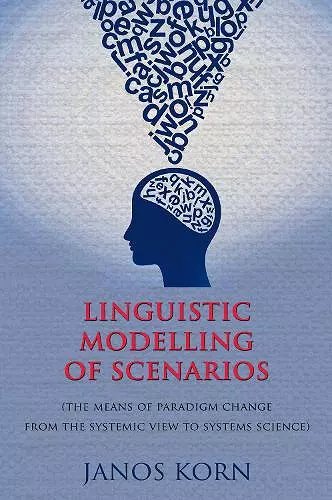Linguistic Modelling of Scenarios
(the means of paradigm change from the systemic view to systems science)
Format:Paperback
Publisher:Troubador Publishing
Published:1st Dec '13
Currently unavailable, and unfortunately no date known when it will be back

Linguistic Modelling of Scenarios proposes a paradigm change from the ‘systemic VIEW’ to ‘systems SCIENCE’, so as to extend the methodology of conventional science of physics into the domains hitherto beyond the reach of this kind of treatment. The book: I Identifies the problematic issues in current approaches to the 'systemic or structural view' of parts of the world as opposed to the 'quantitative/qualitative views' of conventional science of physics and the arts whereby introducing the 'third culture'. II Locates the position of the structural view in the context of 'human intellectual endeavour'. III Discusses the fundamental questions raised by modelling aspects of human behaviour. IV Introduces the basic ideas and the symbolism of linguistic modelling which are then applied to turning descriptions of scenarios as a story or narrative into reasoning schemes. V Describes a methodology of 'problem solving' of which design thinking and the operation of purposive systems are seen as essential ingredients. Problem solving is a universal activity of living in particular human beings through innovation, invention and creativity. Lack of this activity leads to death! Problem solving is regarded as pivotal point which may propel the spread of the modified structural view into social, technical, cultural and educational awareness. VI Shows the location of aspects of conventional science within the scheme of systems science whereby achieving a 'continuity of the scientific endeavour'. VII Outlines a teaching scheme for 'linguistic modelling'. Janos Korn explains how a view can be converted into a science which can lead to a possibility of ‘organised speculation’ or simulation of behaviour, exploring the effects of variation of parameters on performance, and the occurrence of outcomes of operations, beneficial or not, of dynamic structures. Static and dynamic structures are expressed in more rigorous and computable terms so that the results of analysis and design of human activity scenarios could be exposed to at least thought experiments. Linguistic Modelling of Scenarios is an informative read for any professionals, teachers and students of engineering, social science, management, business and production.
ISBN: 9781783061808
Dimensions: unknown
Weight: unknown
304 pages